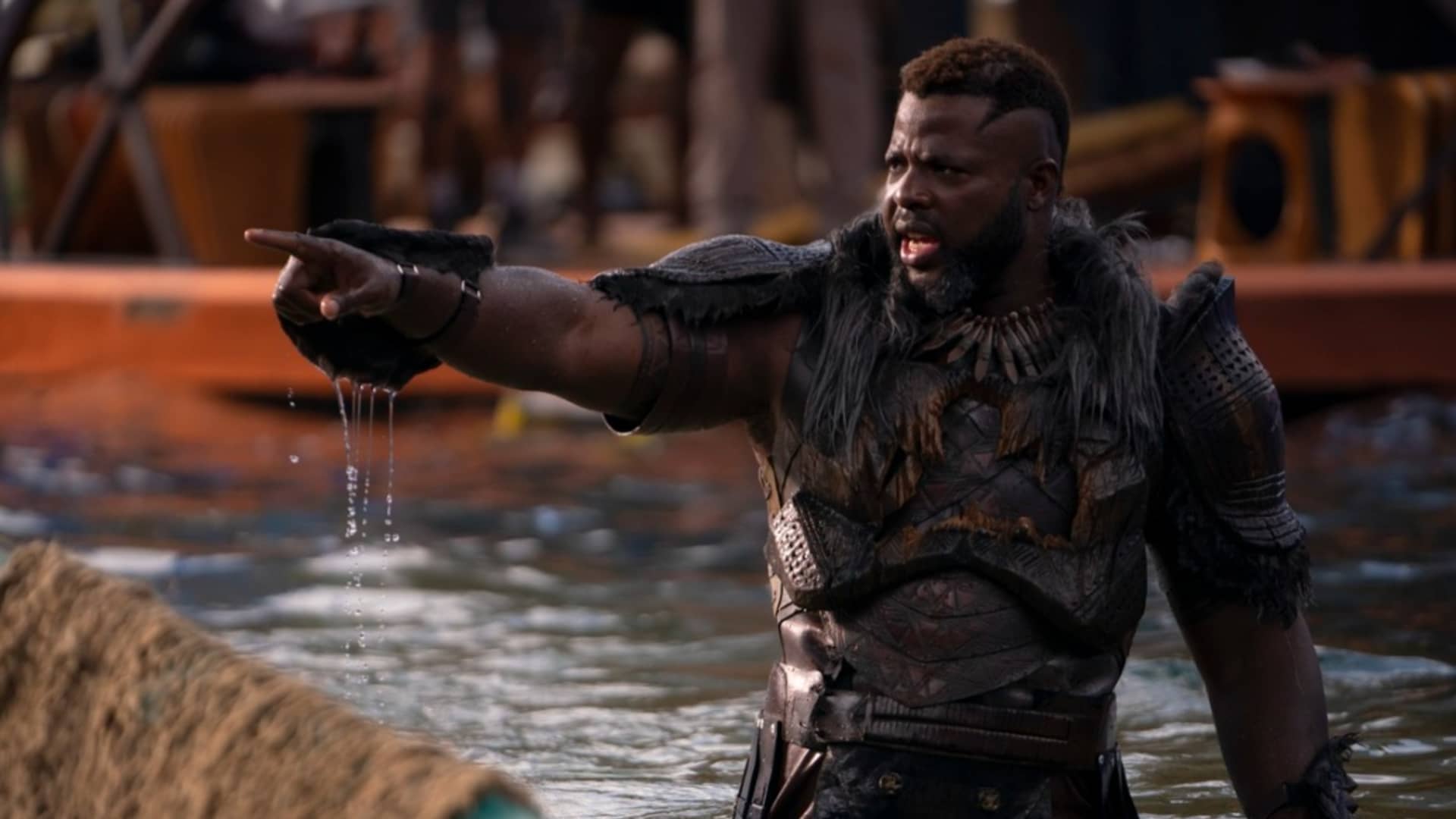It’s impossible to replace the irreplaceable, but that was Ryan Coogler’s task as the director and co-writer of Disney’s latest Marvel Cinematic Universe film, “Black Panther: Wakanda Forever.”
The sequel to 2018’s blockbuster hit “Black Panther” takes place after the real-world death of actor Chadwick Boseman, who portrayed the titular hero in several Marvel films before dying from cancer in 2020. He was 43.
“Wakanda Forever” had the unenviable charge of not only being a memorial to the late Boseman, but also move the multibillion-dollar MCU franchise forward into its next chapter. It is expected to post a huge opening weekend.
Coogler, alongside Marvel Studio’s executives, decided not to recast the character of T’Challa. Instead, the film opens with the off-screen death of the character. The story that follows centers on how the secondary characters in the world of Wakanda deal with that loss as well as the encroachment of the rest of the world, which has become aware of the country’s rare and powerful resource — vibranium.
Several critics called the plot overstuffed, as Coogler seeks to pay tribute to Boseman and establish the necessary markers for future MCU projects. The film introduces Tenoch Huerta as Namor, the ruler of Talokan, a fictional kingdom based on Atlantis, as well as Riri Williams, known in the comics as Ironheart, who will star in her own Disney+ series.
Despite its length and heftiness, “Wakanda Forever” has generated an over 80% “fresh” rating on Rotten Tomatoes from about 300 reviews.
Here’s what some critics thought of “Black Panther: Wakanda Forever” ahead of its Friday debut:
Kristy Puchko, Mashable
Puchko says the film, while action-packed, is at its core about how people handle loss differently. This is particularly evident in how T’Challa’s mother Queen Ramonda (Angela Bassett) and his sister Shuri (Letitia Wright) quarrel over the future of Wakanda.
“Through their mother-daughter battles — born of love and broken hearts — Coogler poses questions that hit hard,” Puchko wrote. “What to we owe to those we’ve lost? Is their legacy our responsibility? Or are we responsible for our own legacies? Might their memory bolster us or blind us to what our futures could be without them?”
Wright, who spent much of the first “Black Panther” as comic relief, now takes on a more serious lead role, one that many critics praised.
“[Wright] handles this shift well, bringing a maturity to the pesky little sister without entirely losing her bear-poking edge,” Puchko said.
Moira Macdonald, Seattle Times
“Boseman’s T’Challa is a spirit that lovingly haunts the film,” Macdonald writes.
“It’s part of the great strength of ‘Black Panther: Wakanda Forever’ that it doesn’t shy away from that sadness; this is, after all, a superhero movie, and Coogler might have been forgiven for wanting to quickly cut to the chase, so to speak,” she wrote.
Instead, the filmmaker allows the characters and the audience to absorb the loss before flashing forward.
“There’s so much that ‘Black Panther: Wakanda Forever’ does right that it’s frustrating to blame it for the one flaw it can’t help,” she wrote. “But you watch it wondering about the movie that never got made, the story that never got finished, the life cut short too soon.”
Leah Greenblatt, Entertainment Weekly
Much like the first “Black Panther,” Coogler is being praised for filling the “Wakanda Forever” production with talented female actors and creators. Hannah Beachler and Ruth Carter, who won Oscars for production design and costuming for their work on the first film, are back and earning more raves.
“Their shared vision of Afro-futurism feels lush and joyful and beautifully specific set against the usual white noise of Marvel fanfare, even (or almost especially) in darker moments, like the pristine rituals of a funeral scene,” Greenblatt writes. “‘Wakanda’ is still clearly a Marvel property, with all the for-the-fans story beats and secondary characters its ever-expanding universe requires, but it also feels apart from any one that’s come before.”
Greenblatt also touches on how, without King T’Challa, Wakanda has become a matriarchy.
“Without their king, Wakanda has become a queendom from the top down, overseen by Bassett’s regal, ageless Ramonda, the gorgeously daunting Gurira, and Wright, who rises to fill her dramatically expanded role with feline grace and vulnerability,” she wrote.
She notes that while this sequel is likely nothing like what Coogler and Marvel had intended to create prior to Boseman’s untimely death, “the movie they’ve made feels like something unusually elegant and profound at the multiplex; a little bit of forever carved out for the star who left too soon.”
Kambole Campbell, Empire
Critics also praised the performance of Huerta as Namor, also known as the Sub-Mariner in comics, and Coogler’s interpretation of the character. Campbell calls Namor “a unique antagonist.”
“He’s a highlight, an imaginative adaptation of the veteran comics character, one who here speaks truth with convincing venom. Coogler ties him to Mesoamerican history and Spanish colonialism, and there’s a sense — like Wakanda — of a tangible, real-world history.”
Campbell also noted that “Wakanda Forever” “can feel overly busy,” since Coogler had a lot of elements to weave into the film.
“It all sprawls into a messy last act that can feel at odds with the rest of the film,” he wrote. “But ’Wakanda Forever’ ultimately lands on a poignant note. In bookends, it deals head-on with the passing of both T’Challa and Boseman, moments that pull the film into a moving, surprisingly personal whole. Even in his absence, Boseman holds ’Black Panther’ together.”
Disclosure: Comcast is the parent company of NBCUniversal and CNBC. NBCUniversal owns Rotten Tomatoes.
